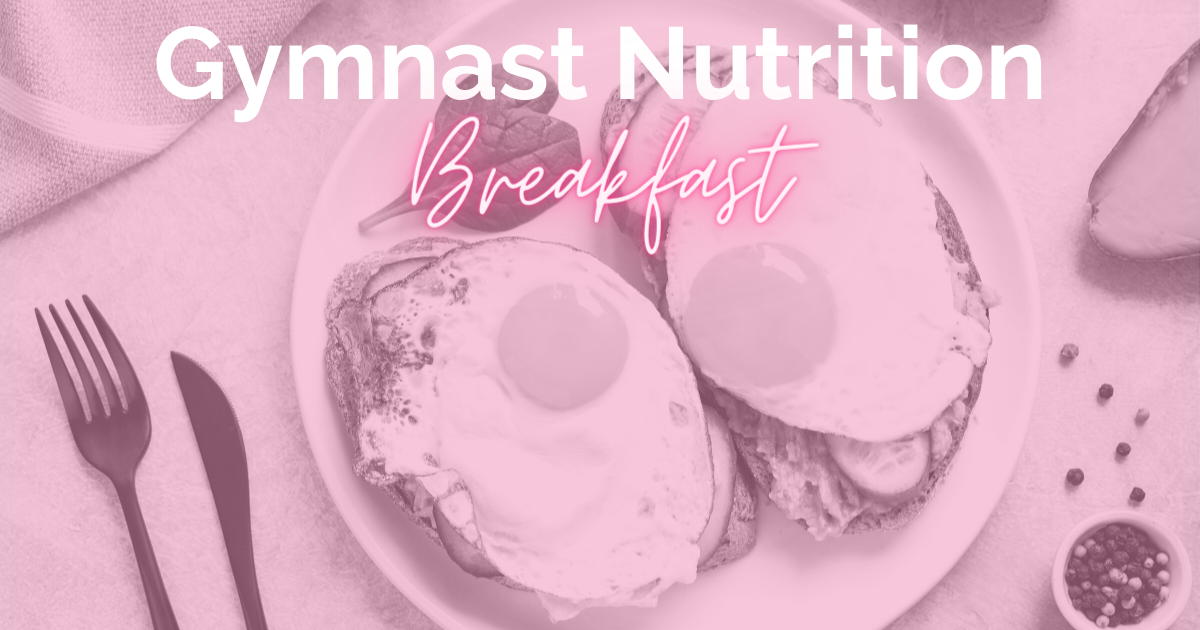explore the blog
free training
The Podcast
Learn to fuel the gymnast for optimal performance and longevity in the sport.
How to Fuel the Gymnast
Learn how to fuel your gymnast so that you can avoid the top 3 major nutrition mistakes that keep most gymnasts stuck, struggling, and injured.
looking for...?
Breakfast…arguably the most important meal of the day, but even more so for the gymnast.
Overnight, while sleeping, the body does its best to repair and recover from the previous day’s activities which likely included intense training, muscle breakdown, and stress. Gymnasts encounter very high levels of physical stress from intense training which can lead to illness and injury. Maintaining proper nutrition is key to help heal existing and prevent future injuries.
These days, you’ll find research to support any kind of dietary approach you’d like (low carb vs high carb, “clean eating” vs “if it fits your macros”, intermittent fasting vs 6 meals a day, etc), but that doesn’t make it right. Among those groups is #teambreakfast which I’m a part of and is fully backed by sports performance science!
As an athlete, you should not wake up starving all the time; if you do, you are likely under fueling. It is normal and appropriate to wake up and be ready to eat, but not all athletes have an appetite first thing in the morning. Often, training starts earlier than a gymnast would normally eat breakfast is allowed to sleep in which results in a missed meal and poor practice.
When I was a young gymnast, I would get nervous before hard practices and stopped eating breakfast. This left me feeling shaky, sluggish, and barely able to make it through conditioning. I thought I need to “just try harder” but in reality my body was needing fuel!
To start the day right, the young gymnast needs several important food groups:
Carbohydrates- Preferably whole grains unless immediately before a training session in which you’d want less fiber as to not slow down the time it takes the carbohydrates to turn into glucose for muscle and brain fuel. Pick from whole grains, fruits, and you’ll also get some carbohydrate from the naturally occurring milk sugar (lactose) in dairy products like milk, yogurt, and cheese.
Healthy fats- helps the body continuing making the appropriate hormones which are involved in all the important bodily functions, including managing inflammation (hello cortisol, not all bad!). Add nuts to a yogurt cup, cheese and olive oil to eggs, or peanut butter to whole grain toast.
Protein- the most important food for repairing muscles and helping you stay full, but it cannot do its job without adequate overall nutrition. So, if you’re skipping breakfast and not eating enough during the day, it doesn’t matter how much protein you eat—your muscles will not recover as well as they could.
Dairy products (cheese, yogurt, milk) are a great way to get in carbohydrate, protein, and much needed calcium which is essential for bone strength and recovery. The dark side of the trendy “plant milk” craze is often inadequate calcium and vitamin D consumption which is no bueno for the gymnastics population who are already at great risk of stress fracture and broken bones.
For athletes that are trying to “get lean”, skipping breakfast is not the thing to do and can actually lead to undesired weight gain. Skipping breakfast sets you up for being extra hungry in the afternoon and evening and can lead to non-stop snacking post-practice. Wholesome, regular meals and snacks keeps the body and brain fueled and in the “I’m OK” state versus a panicked “there’s not enough food/fuel” mindset. I have worked with a lot of athletes that make this one simple tweak to their nutrition routine (adding breakfast!) and find great success. This could be you!
Stay tuned for more gymnast nutrition posts!
If you want more information on fueling the gymnast, join our free training here.
on the blog
